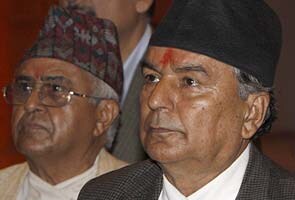
AP Photo
Kathmandu:
Nepali Congress leader Ram Chandra Poudyal, the sole candidate who is adamant over not quitting the prime ministerial race, on Friday failed to garner a majority in Parliament for an unprecedented 14th time in a row, prolonging the leadership crisis in the country.
Four months after the 22-party coalition led by Prime Minister Madhav Kumar Nepal collapsed under intense pressure from the Maoists, the parliament has been unable to elect a new leader despite a series of polls since June 30.
65-year-old Poudyal secured only 96 votes in his favour and two votes were cast against him while 40 of the total 138 lawmakers, who took part in the election, remained neutral.
The next round of Prime Ministerial election, which is also expected to remain deadlocked, is scheduled to take place on November 1.
Main opposition CPN-Maoist, which ended its decade-long civil war in 2006, is the single largest party with 238 seats, while Nepali Congress (NC) has 114 members in the House whose two-year term was extended by one year on May 28.
The CPN-UML, the third largest party with a strength of 109 and the Madhesi alliance with the combined strength of some 80 lawmakers and other smaller parties have called for a national government.
The Maoists, CPN-UML and the Madhesi alliance have been staying away from the election process as they want the formation of a national government.
Nepali Congress has ruled out the possibility of forming the next government under the Maoists' leadership till the former rebels lay down their arms, integrate their combatants with the security forces and dissolve the paramilitary organisation of their youth wing, Young Communist League, so that the peace process could be completed.
As per Nepal's interim constitution, the election process should continue till a new leader is elected in the parliament through a simple majority of 301 vote.
The country has been in political limbo since the June 30 resignation of Nepal. It has stalled the country's peace process and delayed the annual budget, bringing the nation on the brink of financial crisis.
Four months after the 22-party coalition led by Prime Minister Madhav Kumar Nepal collapsed under intense pressure from the Maoists, the parliament has been unable to elect a new leader despite a series of polls since June 30.
65-year-old Poudyal secured only 96 votes in his favour and two votes were cast against him while 40 of the total 138 lawmakers, who took part in the election, remained neutral.
The next round of Prime Ministerial election, which is also expected to remain deadlocked, is scheduled to take place on November 1.
Main opposition CPN-Maoist, which ended its decade-long civil war in 2006, is the single largest party with 238 seats, while Nepali Congress (NC) has 114 members in the House whose two-year term was extended by one year on May 28.
The CPN-UML, the third largest party with a strength of 109 and the Madhesi alliance with the combined strength of some 80 lawmakers and other smaller parties have called for a national government.
The Maoists, CPN-UML and the Madhesi alliance have been staying away from the election process as they want the formation of a national government.
Nepali Congress has ruled out the possibility of forming the next government under the Maoists' leadership till the former rebels lay down their arms, integrate their combatants with the security forces and dissolve the paramilitary organisation of their youth wing, Young Communist League, so that the peace process could be completed.
As per Nepal's interim constitution, the election process should continue till a new leader is elected in the parliament through a simple majority of 301 vote.
The country has been in political limbo since the June 30 resignation of Nepal. It has stalled the country's peace process and delayed the annual budget, bringing the nation on the brink of financial crisis.
Track Latest News Live on NDTV.com and get news updates from India and around the world

